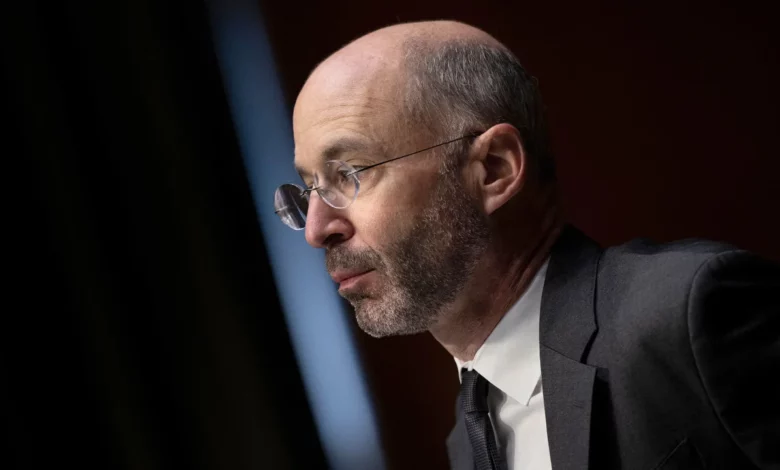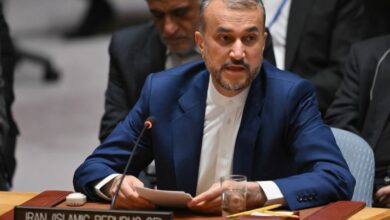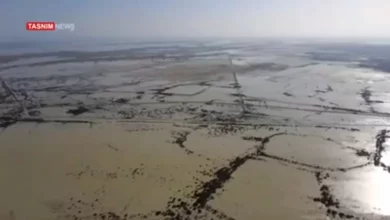
United States officials have said Iran could be just weeks away from acquiring enough weapons-grade uranium to make a nuclear bomb. Now, the man who had been tasked with reviving a nuclear deal to constrain that program has been sidelined.
A prominent diplomat who has been steering the Iran nuclear talks for the Biden administration, Rob Malley, was last month placed on leave without pay, after his security clearance was suspended earlier this year during an investigation into his handling of classified material.
Malley remained in the job for a while as the investigation was underway, but he was not allowed to access classified information, CNN reported earlier.
At the time his leave was announced in June, Malley told CNN that he was told his security clearance was “under review” and said he expects the investigation to be resolved “favorably and soon.”
But on Friday, Deputy Envoy Abram Paley took over the official twitter handle for the Office of the Special Envoy for Iran. Paley tweeted “the entire team at the State Department remain engaged in implementing our policy on Iran.” The State Department website has also removed Malley’s name as the Special Representative for Iran.
In an interview Sunday, US National Security Adviser Jake Sullivan said he “could not speak to the current circumstances” of whether Malley would be returned to his post.
According to a US intelligence assessment published last week, Iran has rapidly expanded its nuclear program since the assassination one of its key scientists in November 2020, but it is not conducting activities that would be necessary to produce a testable nuclear device.
Malley’s sidelining has raised questions about the fate of a long-stalled nuclear deal with Iran, which is seen as more urgent than ever as Tehran proceeds with uranium enrichment, and as both the US and Iran brace for key elections next year.
The Islamic Republic will hold parliamentary elections next year, and the US is due to hold presidential elections. Progress on nuclear talks, as well as the fate of detained Americans in Iran, is likely to boost the incumbents in the polls, analysts have said.
Malley was one of the architects of the 2015 nuclear deal reached with Iran under the Obama administration. This was subsequently abandoned in 2018 by former President Donald Trump.
After Biden’s election, Malley was brought back in 2021 as Iran envoy and became a leading figure in talks to return to a deal.
Last year, a number of sticking points emerged in negotiations, and talks came to a standstill by September. Relations only worsened as the Iranian regime brutally cracked down on a protest movement at home and after it began supplying Russia with drones in its war with Ukraine.
A polarizing figure
Malley had been a polarizing figure even before his appointment as Iran envoy. In 2008, he resigned from Barack Obama’s presidential campaign after it emerged that he had met with members of the Palestinian militant group Hamas while working at the International Crisis Group (ICG) think tank, where he was president and CEO.
Malley’s critics, among them anti-regime Iranians in the diaspora, US conservatives and supporters of Israel, have accused him of being too sympathetic to the Islamic Republic and too hard on its archenemy, Israel.
Asked about Malley’s sidelining, Iranian Foreign Ministry spokesman Nasser Kanani said on July 3: “We do not comment on the internal issues of other countries,” referring to the US.
A former Iranian official was less inhibited. Javed Gurban Oghli, a retired diplomat, was quoted in Iranian media as saying that Malley had “inclinations toward Iran,” which, he said, turned “lobbies close to Israel” against him.
Gabriel Noronha, a former State Department official under the Trump administration who is now a fellow at the Jewish Institute for National Security of America, says Malley’s methods were to blame.
“Malley’s approach was to offer Iran concessions up-front in the form of (suspending) sanctions in an attempt to build goodwill, and he rejected the notion that pressure would generate more leverage,” Noronha, former Special Advisor for the Iran Action Group at the US State Department, told CNN.
“At the same time, Iran was rebuilding its economy and supercharging its nuclear program,” he said, adding that Tehran consequently believed it had had increased leverage over the US. “As a result, he failed to earn the Iranians’ respect or fear, dooming his negotiation prospects.”
But those who have worked closely with Malley disagree that the 60-year-old was too soft on Iran.
Ali Vaez, Iran Project Director at the IGC, said Malley’s actions were in line with the national security strategy of the US administration.
“With or without Rob Malley, the Biden administration believes that the only sustainable solution to the nuclear crisis with Iran is a diplomatic one,” said Vaez, who has known Malley for more than a decade and has reported directly to him at the ICG.
“Those who accuse this administration of ‘being too soft’ on Iran will have a hard time explaining why the US now has more, not less, sanctions on Iran than when President Biden came into office,” Vaez said.
CNN has reached out to Rob Malley for comment through the State Department.
Foad Izadi, associate professor at University of Tehran’s Faculty of World Studies, said Iranian President Ebrahim Raisi wanted a deal and may have been hopeful of reaching one with Malley as envoy.
“The fact that Malley was on the other side was a sign that maybe a similar situation (as the earlier rounds of talks that led to a pact) could be repeated after Biden became president,” he said. “But now we know more than two years after, that that was more or less wishful thinking.”
Where things stand now
US talks with Iran are proceeding without Malley. While Paley is serving as acting Special Envoy for Iran, Brett McGurk, a US National Security Council official and veteran on Middle East policy, has been tapped as the leading official to constrain Iran’s nuclear program.
When Biden took office in 2021, he appointed McGurk as coordinator on Middle East and North African issues at the National Security Council. The administration began negotiations to re-enter an Iran nuclear agreement later that year.
Indirect talks quietly resumed near the end of the year, CNN has reported, and McGurk has been at the center.
Since then, McGurk has made several trips to Oman for indirect discussions with Iranian officials. The latest was in May this year, and Malley appears to have been sidelined from those talks.
McGurk has indicated that he is eager to see a deal take form again, but it’s unclear how his tactics may differ from Malley’s.
He has criticized Trump’s 2019 “maximum pressure” campaign against Iran, which further isolated the Islamic Republic and crippled its economy but failed to stop its nuclear program from advancing. He said that the added sanctions had Iran behaving “more provocatively, not less.” McGurk was also critical of Trump’s other Middle East policies, including those on Syria.
Vaez of the ICG expects no change on US policy toward Iran.
“US policy is informed by the administration’s national security calculations, and not any one person in the national security apparatus,” Vaez said. “With or without Rob Malley, the Biden administration believes that the only sustainable solution to the nuclear crisis with Iran is a diplomatic one.”
Noronha said Malley’s potential departure likely means that a “grand bargain” with Iran won’t be reached, “but the administration’s efforts to reach some limited deal are still proceeding.”




